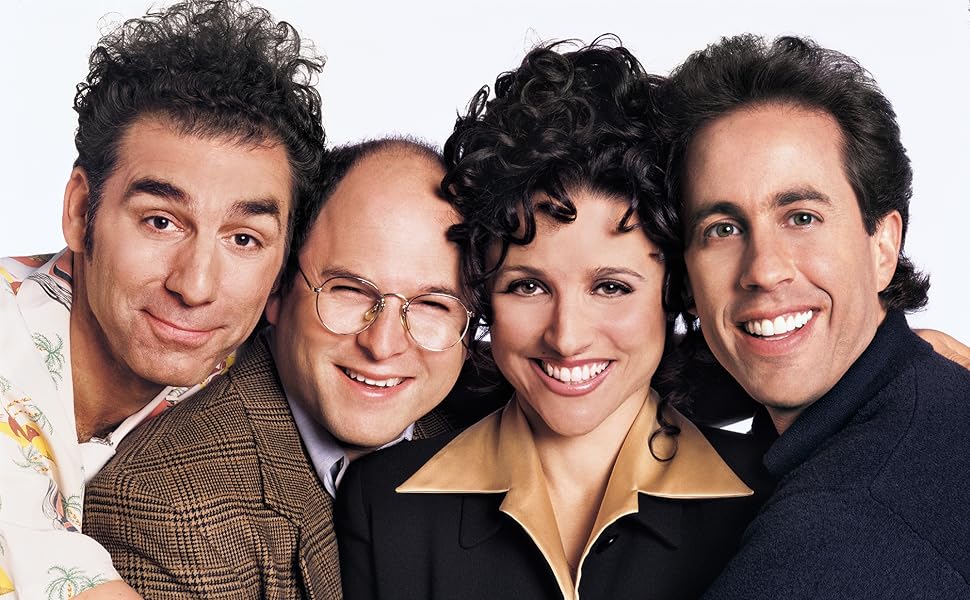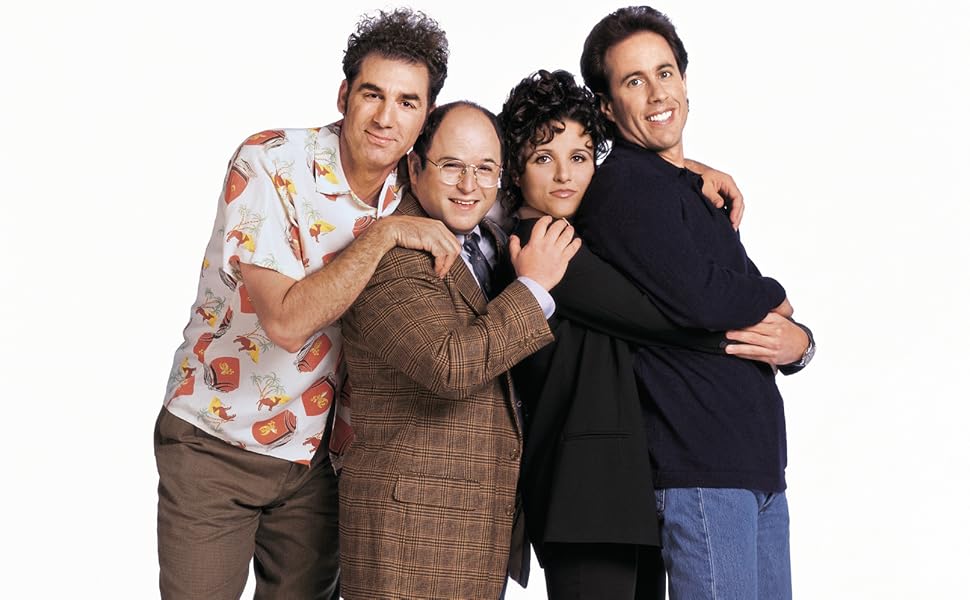“Seinfeld,” often referred to as the “show about nothing,” redefined television comedy and continues to be a cultural phenomenon. Its longevity and relevance have been solidified with the release of Seinfeld: The Complete Series, a comprehensive collection of all nine seasons. This box set, which features 180 episodes and a treasure trove of bonus materials, serves as both a nostalgic trip for long-time fans and a discovery for newcomers. It showcases the innovative humor, quirky characters, and timeless themes that have cemented Seinfeld as a landmark in television history.
This essay delves into the show’s creation, its impact, the unique aspects that made it iconic, and what makes Seinfeld: The Complete Series a must-own for fans of comedy and pop culture enthusiasts alike.
The Genesis of Seinfeld
Seinfeld premiered on July 5, 1989, with a modest pilot episode titled “The Seinfeld Chronicles.” Created by Jerry Seinfeld and Larry David, the show started as an experiment. NBC executives were initially skeptical about the idea of a sitcom centered around the mundane aspects of everyday life. However, the pilot’s dry wit and observational humor set it apart from the typical family-focused sitcoms of the era.
The show officially debuted as a series in 1990, with a shortened first season consisting of just five episodes. By the third season, Seinfeld had found its footing, and it began to attract a loyal audience. Larry David’s insistence on “no hugging, no learning”—a rejection of conventional sitcom sentimentality—became a guiding principle, keeping the show’s tone refreshingly irreverent.
The Core Cast: Chemistry and Characterization
The magic of Seinfeld lies in its core cast, whose chemistry remains unparalleled. Jerry Seinfeld plays a fictionalized version of himself—a stand-up comedian navigating the absurdities of life in New York City. The other principal characters—George Costanza (Jason Alexander), Elaine Benes (Julia Louis-Dreyfus), and Cosmo Kramer (Michael Richards)—bring their own distinct quirks and comedic sensibilities.
.

.
- Jerry Seinfeld is the straight man of the group, often acting as a calm observer of his friends’ antics. His bemused reactions to the ridiculous situations around him form the bedrock of the show’s humor.
- George Costanza, based on Larry David, is neurotic, self-centered, and perpetually unlucky. His endless schemes and insecurities make him one of television’s most memorable anti-heroes.
- Elaine Benes, Jerry’s ex-girlfriend turned close friend, is sharp, ambitious, and unafraid to speak her mind. Julia Louis-Dreyfus’s impeccable comedic timing and physical humor elevated Elaine to one of the most beloved female characters in sitcom history.
- Cosmo Kramer, the eccentric neighbor, provides a steady stream of physical comedy and absurdity. Michael Richards’s performance as Kramer, from his signature entrances to his unconventional ideas, brought an unmatched energy to the show.
Together, these characters created a dynamic that allowed Seinfeld to explore a range of comedic scenarios while avoiding the tropes of traditional ensemble comedies.
The Episodes: A Showcase of Comic Brilliance
The episodes of Seinfeld are both a product of their time and timeless in their relatability. Many of the show’s best moments involve hyper-specific, often trivial situations, which are elevated to absurd heights. Some standout episodes include:
- “The Contest” (Season 4): This Emmy-winning episode revolves around a contest of self-control among the main characters, touching on an adult theme with subtlety and wit that became a hallmark of the show.
- “The Soup Nazi” (Season 7): A tyrannical soup vendor becomes an iconic character, with his catchphrase “No soup for you!” entering the cultural lexicon.
- “The Puffy Shirt” (Season 5): Jerry inadvertently agrees to wear a ridiculous pirate shirt during a televised appearance, a perfect example of the show’s ability to turn minor misunderstandings into major comedic moments.
- “The Chinese Restaurant” (Season 2): This bottle episode, where the characters wait for a table at a restaurant, highlights the humor in frustration and the art of doing more with less.
The creative storytelling, punctuated by Jerry’s stand-up routines, provides a structure that enhances the humor without overwhelming the narrative.
“No Hugging, No Learning”: The Philosophy of Seinfeld
One of the defining aspects of Seinfeld is its steadfast commitment to avoiding sentimental resolutions. Unlike most sitcoms, which often conclude episodes with a heartwarming moment or a life lesson, Seinfeld revels in the flaws of its characters. They rarely grow or change, and their selfish, petty, and sometimes ridiculous behavior remains consistent.
This approach led to criticism during the show’s original run, particularly regarding its infamous finale, which aired on May 14, 1998. The two-part episode sees the main characters on trial for their many transgressions throughout the series. While some fans felt it was a fitting conclusion, others criticized its darker tone and lack of a feel-good ending. In hindsight, however, the finale aligns with the show’s ethos: unapologetically defying expectations.
Cultural Impact and Legacy
Seinfeld was more than just a hit show; it became a cultural touchstone. Its influence can be seen in the language it introduced into everyday conversation. Phrases like “yada yada yada,” “shrinkage,” and “close talker” have become part of the vernacular. Episodes inspired debates, parodies, and academic discussions, cementing its place in pop culture.
The show’s impact on comedy is immeasurable. It paved the way for other unconventional sitcoms, such as Curb Your Enthusiasm (created by Larry David), Arrested Development, and It’s Always Sunny in Philadelphia. Its emphasis on character-driven humor and observational comedy set a new standard for television writing.
Seinfeld: The Complete Series – A Treasure Trove
The release of Seinfeld: The Complete Series allows fans to relive every iconic moment while gaining new insights into the making of the show. This comprehensive collection includes not only all 180 episodes but also a wealth of bonus features that provide a deeper appreciation for the series.
Highlights of the Collection
- Behind-the-Scenes Features:
- Insightful documentaries on the show’s development and production.
- Interviews with cast members, writers, and directors, shedding light on their creative process.
- Deleted Scenes and Bloopers:
- Fans can enjoy moments that didn’t make it to air, offering a glimpse into the cast’s chemistry and the show’s improvisational spirit.
- Commentaries:
- Selected episodes feature commentary tracks from Jerry Seinfeld, Larry David, and others, providing context and anecdotes that enrich the viewing experience.
- Remastered Episodes:
- Enhanced picture and sound quality ensure that the show looks and sounds better than ever.
- Collectible Packaging:
- A beautifully designed box set, complete with episode guides and exclusive artwork, makes this collection a must-have for any fan.
Why It Endures
More than two decades after its finale, Seinfeld remains as relevant as ever. Its exploration of universal themes—awkward social interactions, the quirks of modern life, and the absurdity of human behavior—resonates with new generations. Streaming platforms have introduced the series to younger audiences, proving its timeless appeal.
.

.
Moreover, the show’s unique structure and character dynamics continue to inspire creators and writers. The brilliance of Seinfeld lies in its ability to find humor in the mundane and to elevate everyday annoyances into comedic gold.
Conclusion
Seinfeld: The Complete Series is a celebration of one of television’s most influential comedies. It captures the spirit of a show that dared to be different, and it offers fans an opportunity to immerse themselves in its world of quirky characters, unforgettable catchphrases, and groundbreaking humor. Whether revisiting classic episodes or exploring the bonus features, this collection is a testament to the enduring legacy of Seinfeld.
In the end, Seinfeld wasn’t really a show about nothing—it was a show about everything. From its groundbreaking approach to storytelling to its unforgettable cast, Seinfeld continues to be a comedic masterpiece, earning its place in the pantheon of television greatness. The Complete Series ensures that its brilliance will be appreciated for generations to come.
Check out Seinfeld: The Complete Series on Amazon by clicking here.
.

